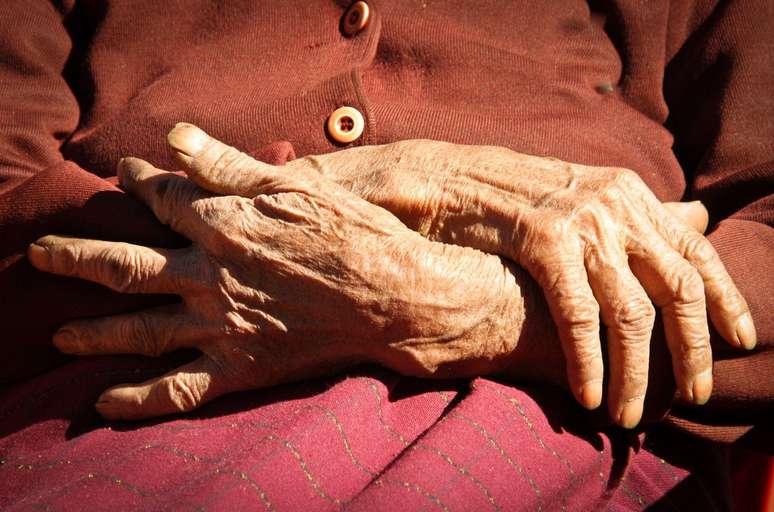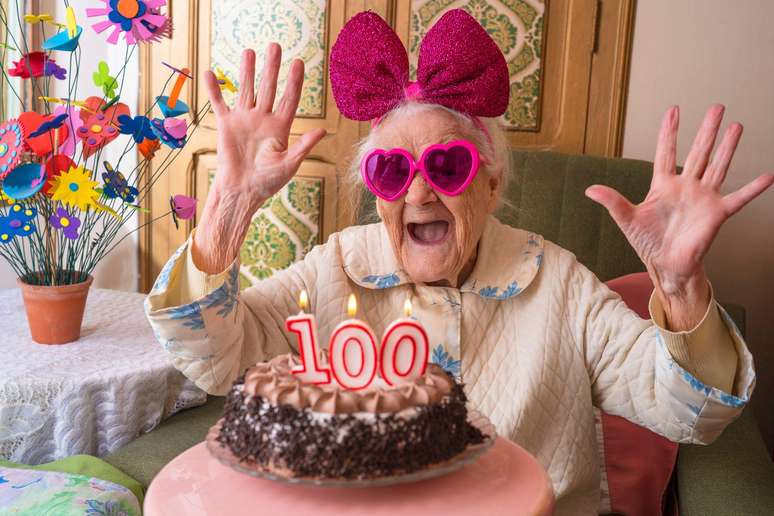Not only genetics defines a person’s longevity. Psychological factors are also important.
Blowing out 100 candles on your birthday cake is no longer an exceptional event.
Data from the United Nations Population Division indicates that 621 thousand people had reached three digits of age in 2021. In 1990 there were only 92 thousand.
Spain, the scene of our research on the topic, is one of the countries with the highest number of centenarians on the planet: there are 19,639, according to the latest data from the country’s National Institute of Statistics. Of these, 77% are women.
In Brazil, the number of people aged 100 and older has risen from nearly 24,000 people in the 2010 census to 37,814 in 2022, according to IBGE data: 72% are women.
The keys to healthy aging
Within this population, our research group studied the characteristics of people who have reached 100 years of age in good health, i.e. without showing signs of cognitive deterioration and enjoying a fair amount of physical autonomy.
After all, it is this privileged group that may offer some keys to healthy aging.
It is clear that genetic and lifestyle factors are very important in achieving extreme longevity in good health. But what is the role of psychological factors?
Research indicates that people who experience more positive emotions and are more satisfied with their lives are more likely to live longer.
Furthermore, psychological resources (such as optimism, resilience, self-esteem, etc.) are not the only ingredients that fuel our psychological well-being. They also contribute to physical and mental health.

In other words, centenarians
In recent research, we asked whether healthy centenarians actually possess psychological resources or positive personality characteristics that may have helped them cope more successfully with the traumatic situations, difficulties and challenges imposed by such a long life.
To answer this question we conducted in-depth interviews with 19 healthy people aged between 100 and 107 (including 16 women).
We conclude that centenarians share 19 psychological resources, which we group into eight categories. Here they are, accompanied by some representative testimonies from the elderly.
1. Vitality
The centenarians interviewed are active and participatory people. They are busy with life and have a clear desire to continue living.
Some of them worked into old age and are currently still active, physically and intellectually.
“I sewed until I was 98. Now I really like doing crosswords and trying to solve Sudoku. I take the elevator to go down to the floors, but I take the stairs to go up, to exercise my legs” (woman, 100 years) .
“At 6 o’clock it’s grandparents’ day and I’m going. After all, there’s bingo and I don’t want to miss it” (man, 100 years old).

2. I like interaction
Sociability is his characteristic. They feel loved by those around them and have helped others whenever they can throughout their lives.
“I’ve never had difficulty making friends; that’s why I’m very friendly. I’ve had many friends” (woman, 104 years old).
“Well, he likes me a lot. Every time I meet a nun, he caresses me and says something nice, not everyone does that” (man, 100 years old).
“An elderly couple with few resources came to eat at my house every day” (woman, 102 years old).
3. Commitment
The centenarians studied were responsible, competent, hard-working, well-liked, loved, and honest people. They persevered to achieve their goals.
“My bosses liked me a lot. I stayed with them for seven years and, the day I got married, you cried as if you were my mother” (woman, 103 years old).
“It’s been four years since I broke my hip and, after about a month, I was already walking, without crutches or walker, without anything. I’m very persevering” (woman, 101 years old).
4. Control
The older adults interviewed have taken control of their lives. They demonstrated autonomy in decision making and knew how to find opportunities.
“When my husband got sick, I had to deal with everything. I took over my husband’s business, I took care of the accounts and the banks, I bossed the men, everything” (woman, 102 years old).
5. Intellectual motivation
They are curious people, who appreciate culture and are motivated to learn. In many cases, they are tireless readers.
“Often, when I was with the animals, I made the mistake of reading and the sheep invaded the plantation. Then the guard came and said: ‘don’t you see where the sheep have gone, they are eating the plantation? ‘ (…) I I read everything I could and I also wrote a lot” (man, 100 years old).
6. Positivity
Centenarians show gratitude and know how to take pleasure in the little things of everyday life.
“Life gave me everything, thank God. It gave me sadness, like losing family members, but I didn’t feel bad” (woman, 100 years old).
7. Resilience
Despite the difficulties (childhood problems, loss of loved ones, events such as the Spanish civil war and Covid-19…), the centenarians interviewed were able to move forward with their lives and, in some cases, change direction.
Most importantly, his experience with adversity caused no psychological damage.
“I was very close to my wife. When she died, I was 97 years old and my daughter thought I wouldn’t get over it. At first I felt bad, but then I thought that you only live once and you have to be strong, because my wife he wouldn’t want to see me make a bad impression” (man, 101 years old).
8. Intelligence
Centenarians have been able to face challenges for which they had no concrete training and have overcome them successfully.
They are curious and love to learn. Their conversation is fast, agile and they have a good memory. They know how to read and write, some without ever having attended school. They adapted and directed their lives in ways that left them satisfied.
“For 20 years I was president of the Agricultural Chamber [nunca teve formação específica]” (man, 100 years old).

Lessons from centenarians
Analysis of the lives of healthy centenarians provides some clues to achieving a healthy old age:
- Stay physically active.
- Take care of social relationships, express love to your loved ones, and be willing to help.
- Promote attitudes of commitment, responsibility, honesty and perseverance throughout life.
- Set realistic short- and medium-term goals and strive to achieve them.
- Have a broad vision to find opportunities beyond your immediate environment or comfort zone.
- Establish order and certain habits in daily life, so that the demands of daily life do not cause exhaustion.
- Keep your mind active, including exploring new areas of knowledge and learning (painting, writing, etc.).
- Be curious: for example, discover new cultures, read, travel…
- Practice gratitude, maintaining awareness of all the good things in life.
- Having fun, learning to identify and explore positive daily experiences.
- Develop skills that allow you to accept negative and stressful events as part of life. And, as much as possible, extract the positive essence from adverse events.
- Challenge the mind. Try to solve increasingly difficult problems.
* María Dolores Merino Rivera is a professor of differential psychology, psychological well-being and occupational health at the Complutense University of Madrid, Spain.
This article was originally published on the academic news website The conversation and republished under a Creative Commons license. Read the original version here in Spanish.
Source: Terra
Ben Stock is a lifestyle journalist and author at Gossipify. He writes about topics such as health, wellness, travel, food and home decor. He provides practical advice and inspiration to improve well-being, keeps readers up to date with latest lifestyle news and trends, known for his engaging writing style, in-depth analysis and unique perspectives.








